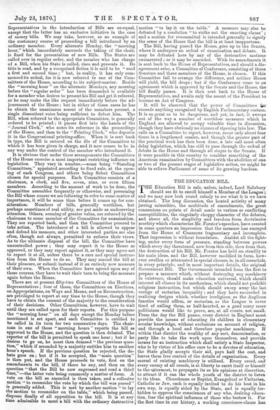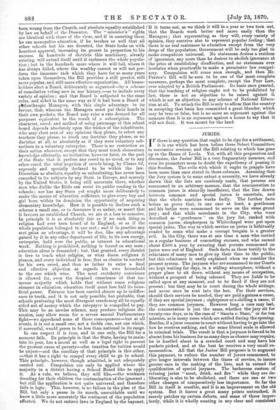THE EDUCATION BILL. T HE Education Bill is safe, unless, indeed,
Lord Salisbury should see fit to enroll himself a Member of the League ; and we may now look round calmly to see what it is we have obtained. The long discussion, the heated activity of many jarring minorities, the multitude of amendments, the great concessions on points of detail made to various or conflicting susceptibilities, the singularly choppy character of the debates, and above all, the simplicity and freedom from doctrinaire acerbity which characterize Mr. Forster's speeches, have created in some quarters an impression that the measure has emerged from the House of Commons fragmentary and incomplete. That impression is without foundation. Amidst all the fight- ing, under every form of pressure, standing between powers which every day threatened, now from this side, then from that, the destruction of his Bill, Mr. Forster has held on steadily to his main ideas, and the Bill, however modified in form, how- ever swollen or attenuated in special clauses, is, in all essentials, in every principle, and in most important details, the original Government Bill. The Government intended from the first to prepare a measure which, without destroying any machinery in existence, should make education universal, which should interest all classes in its mechanism, which should not prohibit religious instruction, but which should sweep away the last vestige of sectarian inequality ; and they have succeeded in realizing designs which, whether irreligious, as the Anglican fanatics would affirm, or sectarian, as the League is never tired of calling them, or half-hearted, as a good many mere politicians would like to prove, are, at all events, not small From the day the Bill passes, every district in England must provide the means of educating its children in elementary secular knowledge, without exclusions on account of religion, and through a local and therefore popular machinery. If within that district the wealthy of any sect, denomination, or party like to take the work upon themselves, and provide means for an instruction which shall satisfy a State Inspector, who is by virtue of his office sure to be a devotee of education, the State gladly accepts their aid, pays half the cost, and leaves them free control of the details of organization. Every morsel of existing machinery is utilized. Every creed, and every enemy of all creeds, is at liberty to exert itself or himself to the lattermost, to propagate its or his opinions at discretion, to attract if it can the whole youth of the district to listen to its ideas. Churchman or Baptist, Evangelical or Unitarian, Catholic or Jew, each is equally invited to do his best in his own way, is equally aided by the State, and is equally for- bidden to oppress the consciences of any who, desiring educa- tion, fear the spiritual influence of those who bestow it. For the first time in our history, a working conscience-clause has been wrung from the Church, and absolute equality established by law on behalf of the Dissenter. The " minister's " rights are identical with those of the vicar, and if in asserting them he can monopolize education, if he teaches so well that all other schools but his are deserted, the State looks on with heartiest approval, increasing its grants in proportion to his success. In hundreds of districts this machinery, already existing, will extend itself until it embraces the whole popula- tion; but in the hundreds more where it will fail, where it has always failed, where the wealthy cannot or will not per- form the immense task which they have for so many years taken upon themselves, the Bill provides a still greater, still more popular, and still more effective organization. All house- holders elect a Board, deliberately so organized—by a scheme of cumulative voting new in our history,—as to include every variety of opinion ; and that Board is subjected to the same rules, and aided in the same way as if it had been a Board of philanthropic Managers, with this single advantage in its favour, that, whereas the Managers must put their hands in their own pockets, the Board may raise a rate deemed for all purposes equivalent to the result of a subscription. The character, creed, and method of using patronage of this school board depends absolutely upon the wishes of the inhabitants, who may elect men of any opinions they please, to select any teachers they please, to teach any doctrine they please, or no doctrine at all, as absolutely as if they were voluntary sub- scribers to a voluntary enterprise. There is no restriction on their action whatever, except that they must teach elementary knowledge efficiently, no indication, however faint, on the part of the State that it prefers any creed to no creed, or to any other creed, the total negation of creeds being, by Clause 92, expressly and specially declared to be within the law. Discretion so absolute, equality so unhesitating, has never been conceded to its subjects by any State in Europe, and scarcely by the United States, it being still uncertain there, whether men who dislike the Bible can resist its public reading in the schools ; nor has any State yet sought more deliberately to make the means of education sufficient, to give every boy and girl born within its dominion the opportunity of acquiring elementary knowledge. How it is possible to declare such a scheme a small one, or to denounce it as unfair, or assert that it favours an established Church, we are at a loss to conceive. In principle it is as absolutely fair as if no such thing as religion had ever been heard of in England, or as if the whole population belonged to one sect ; and if in practice any sect gains an advantage, it will be due, like any advantage gained by it in any other department of life, to its own energy, enterprise, hold over the public, or interest in educational work. Nothing is prohibited, nothing is forced on any man ; education alone is demanded ; but, that granted, every district is free to teach what religion, or what dozen religions it pleases, and every individual is free, first as elector to contend for his own creed, and then as father to enter a final and effective objection as regards his own household to the one which wins. The most crotchetty conscience is allowed for, even the despised conscience of that im- mense majority which holds that without some religious element in education, education itself must lose half its bene- ficial power. Fairness has been carried almost up to indiffer- ence to truth, and it is not only possible, but probable, that schools professing the most divergent creeds may all be equally aided out of money which the ratepayer is compelled to pay. This may be an unwise scheme, may produce religious dis- sension, may allow room for a severe annual Parliamentary fight—we apprehend none of those consequences—but at all events, it is not a small one, not a feeble one, not one which, if successful, would prove to be less than national in its range.
In one respect it is true, and in one only, the Bill for a moment fails. Its principle is that the State, having to main- tain its poor, has a moral as well as a legal right to prevent the greatest cause of poverty—else taxation for tuition would be unjust—and the corollary of that principle is this other, —that it has a right to compel every child to go to school. This principle, however, though admitted, is not adequately carried oat. Compulsion can only be applied where the majority in a district having a School Board like to apply it. As a rule, we believe, they will like,—the workmen dreading for their children the contamination of the ignorant ; but still the application is not quite universal, and therefore fails in logic. This, however, is no failure in the plan of the Bill, but only a pause in its march, unavoidable until we know a little more accurately the sentiment of the population affected. We do not enforce laws in England by the bayonet. If it turns out, as we think it will in a year or two turn out, that the Boards work better and more easily than the Managers ; that representing, as they will, every variety of opinion, they contrive also to represent popular feeling ; that there is no real resistance to education except from the very dregs of the population, Government will be only too glad to make compulsion universal. No statesman desires a residum of ignorance, any more than he desires to abolish ignorance at the price of establishing disaffection, and no statesman ever hesitates when practicable to make a permissive law compul- sory. Compulsion will come soon enough,. and then Mr. Forster's Bill will be seen to be one of the most complete measures, perhaps the most complete, except the Poor Law, ever adopted by a British Parliament. Its basis once granted, that the teaching of religion ought not to be prohibited by law, there is not an objection to be raised against it which is not an objection to any scheme of National Educa- tion at all. To attack the Bill is only to affirm that the country in accepting that basis has committed a great blunder, which may be true or false, but is no more an argument against the measure than it is an argument against a house to say that it will not float. It was meant for the land.































 Previous page
Previous page